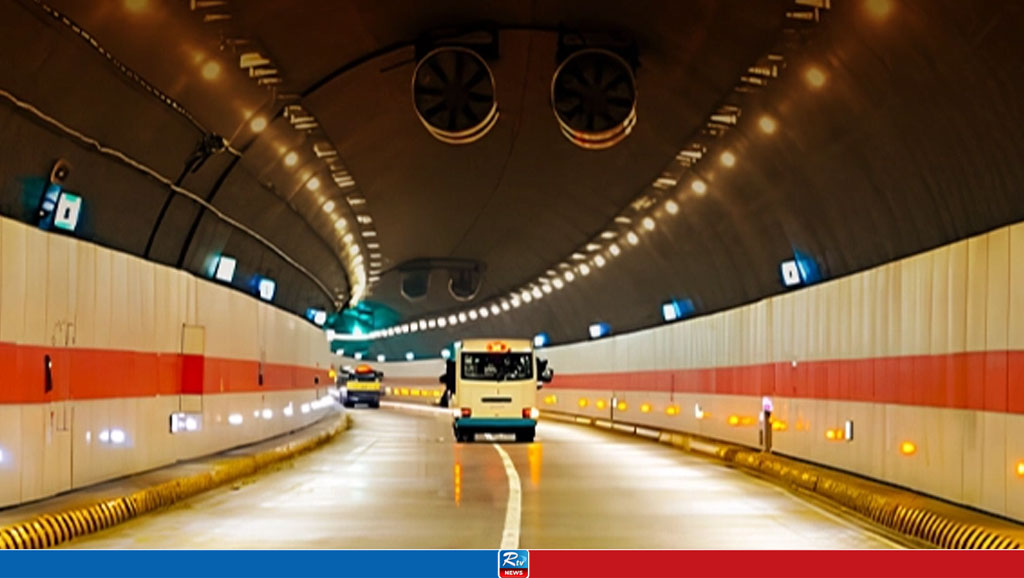Road Transport and Bridges Adviser Muhammad Fouzul Kabir Khan has termed the Karnaphuli Tunnel project an instance of 'political showmanship and said they are working to mitigate the huge losses from this 'unrealistic' project.
"This tunnel is an unrealistic project. It was essentially a politically motivated project, a display for earning public attention. Other countries have tunnels underwater, why shouldn't we have one? But current realities reveal that it was grandstanding," adviser Fouzul said in an exclusive interview with UNB recently.
The tunnel, built at a cost of around Tk 10,700 crore, cannot simply be shut down or dismantled, he said, adding, "We are reviewing the reasons behind the losses and are working on ways to mitigate that."
Strategies will be worked out in coordination with relevant departments to reduce losses, he said.
The adviser added that authorities are exploring options to increase traffic flow through the tunnel but any investment would be based on concrete data, not inflated projections. "We have to repay our foreign loans, so there will be no speculative studies," the adviser said.
He said the tunnel under the Karnaphuli River in Chattogram—Bangladesh's first underwater tunnel—failed to see its projected benefits, resulting in substantial daily losses.
Criticizing the previous Awami League government, he added, "They took up projects for the sake of having projects without considering national interests. This attitude has caused significant losses to the country."
He said the tunnel expenses have exceeded income significantly and vehicle flow estimates made before the tunnel’s construction have proven inaccurate, he added.
There were also flaws in the tunnel design as it was constructed with a shorter headroom of 4.9 meters which restricts the movement of heavy vehicles and fuel-carrying transport movement is prohibited due to safety concerns, thereby reducing potential traffic volume, said the Adviser.
Besides, projects planned for Chattogram's southern region and Cox's Bazar over the project were not implemented, limiting the tunnel's usage.
Karnaphuli Tunnel was built at a cost of Tk 10,700 crore. The tunnel project was implemented with joint funding of the governments of Bangladesh and China (G2G).
The Exim Bank of China provided a loan of Tk 5,913 crore while the Bangladesh government funded the rest.
The Karnaphuli River divides Chattogram into two parts. The tunnel being built – following the "One City, Two Towns" model like Shanghai in China – aiming to connect the port city on the north with Anwara upazila on the south.
Bridge Authority's statistics
According to the reports of the Bangladesh Bridge Authority, since the tunnel’s opening on October 28 last year, revenue has consistently fallen short of operational costs.
In its first operational month, November, 166,312 vehicles used the tunnel, a daily average of 5,544, earning Tk 3.94 crore. However, by April this year, traffic dropped to an average of 3,855 vehicles per day. For the first 21 days of September, the average daily vehicle count further dropped to 3,073, showing a downtrend.
Currently, an average of Tk 11.80 lakh is being earned daily as a toll from the tunnel. However, since the tunnel is constructed underground, a substantial amount of money has to be spent each day to provide artificial oxygen and lighting, along with general and emergency security measures.
On average, around Tk 37.47 lakh is being spent every day to cover these operational costs. As a result, the daily loss amount reaches over Tk 25 lakh.
The Bridge Authority statistics reveal that over the past year, the tunnel saw about 14.11 lakh vehicles, 76% of which were light vehicles, with only 10% buses and 12% trucks.
Revenue from this vehicle flow has amounted to Tk 37.44 crore, far below projections.
Construction firm estimates from 2017 anticipated that, if opened by 2020, the tunnel would handle around 20,719 vehicles daily, growing by 6.4% annually to 28,305 vehicles per day by 2025, and nearly 38,000 by 2030. However, current figures fall drastically short of these projections, with a daily average of just 4,613 vehicles as of August this year, most of which are tourist transports.
Source: UNB

